Photos: Area Veterans pay tribute to memorial sites around Batavia
Among the Memorial Day observances in Batavia on Monday were at the Harvest Avenue.memorial and the Upton Monument.
Among the Memorial Day observances in Batavia on Monday were at the Harvest Avenue.memorial and the Upton Monument.
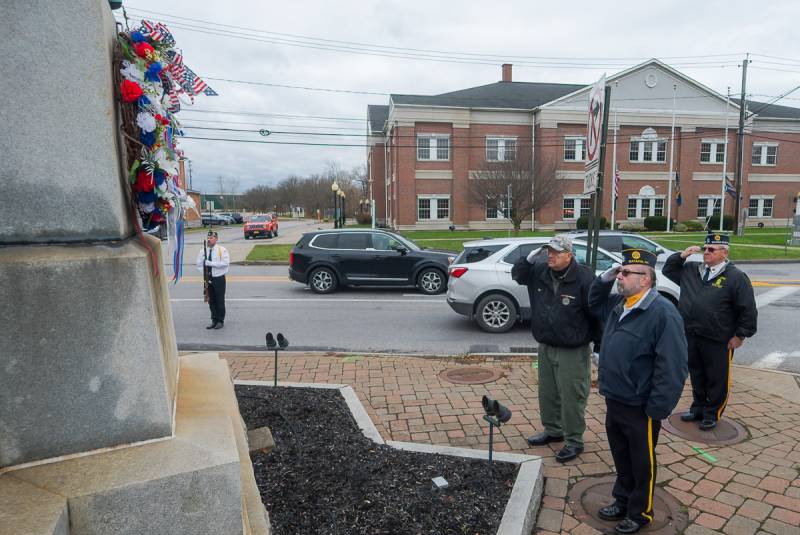
The many who have served in the U.S. military throughout the nation's history were honored on Monday for Veterans Day, with multiple ceremonies being held at sites in Genesee County.
At 11 a.m., veterans gathered to honor veterans at the Soldiers, Sailors, & Marines Monument (the Upton Monument).
There were also ceremonies in Genesee County Park and Forest, the Batavia VA Medical Center, the NYS Veterans Home, and the memorial monument at Jerome Center. There was also a ceremony in Trigon Park in Le Roy.
Participating organizations were Veterans of Foreign Wars, the American Legion, and Vietnam Veterans of America.
Photos by Howard Owens.
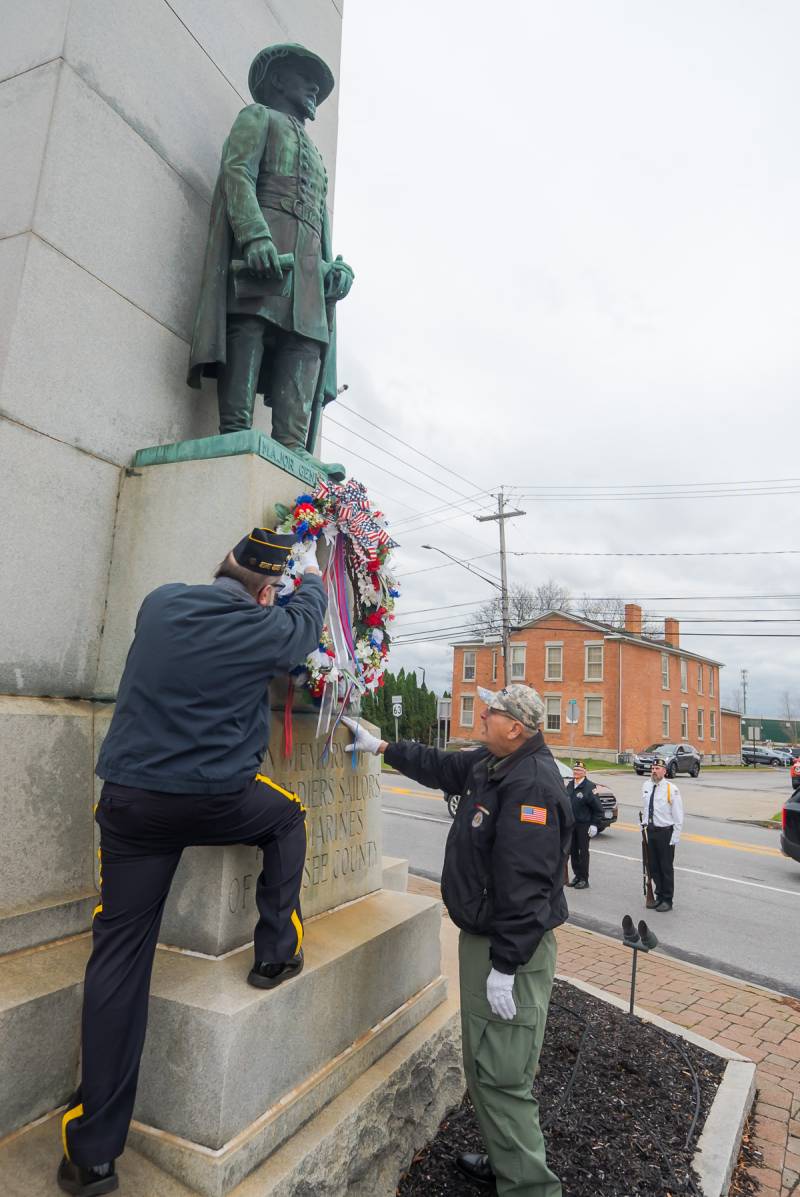
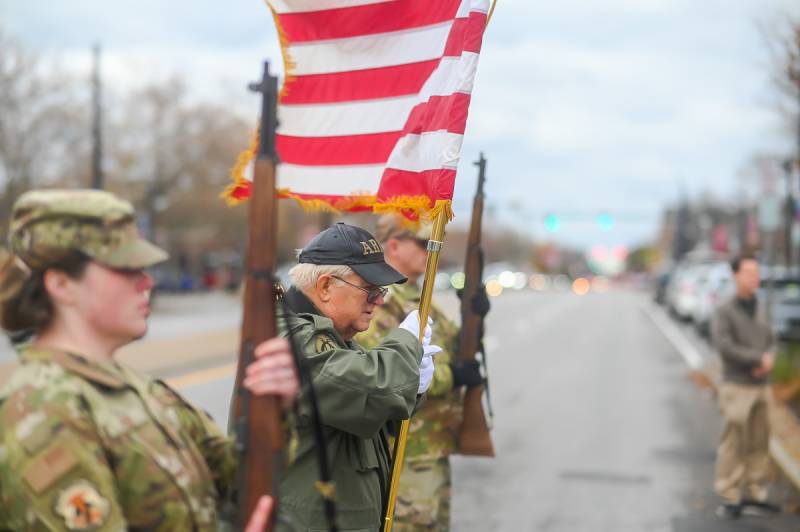
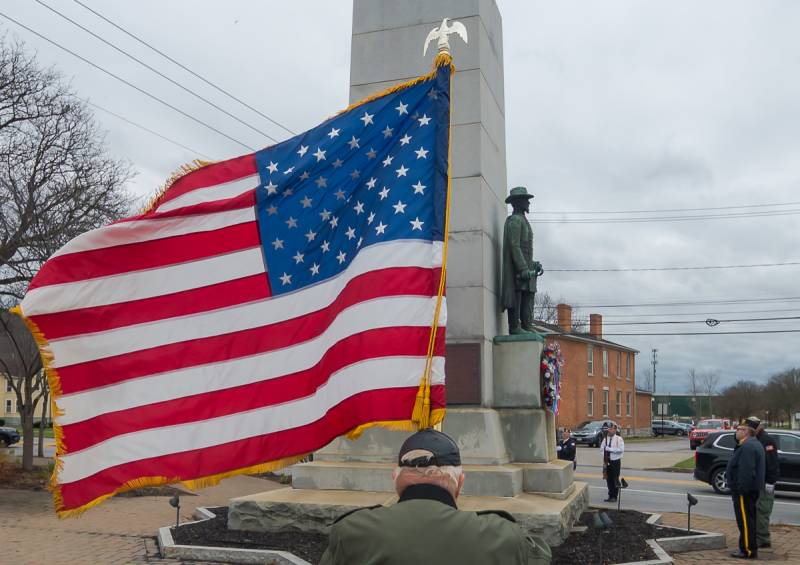
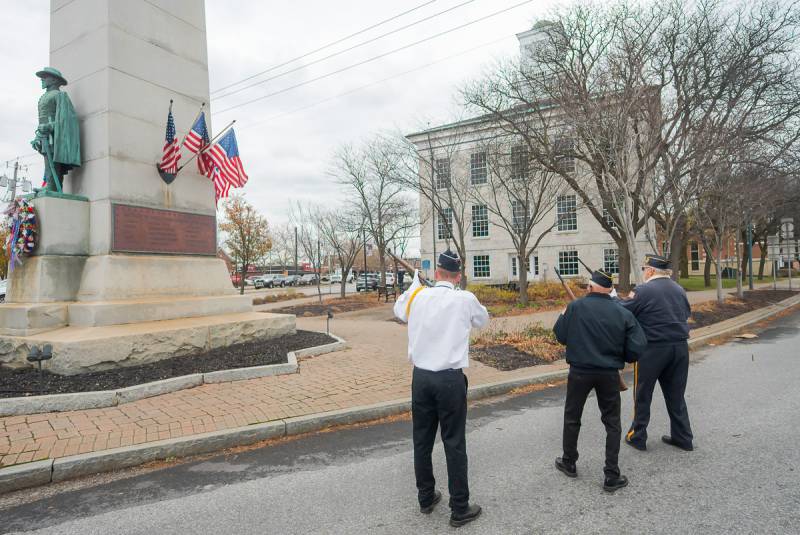
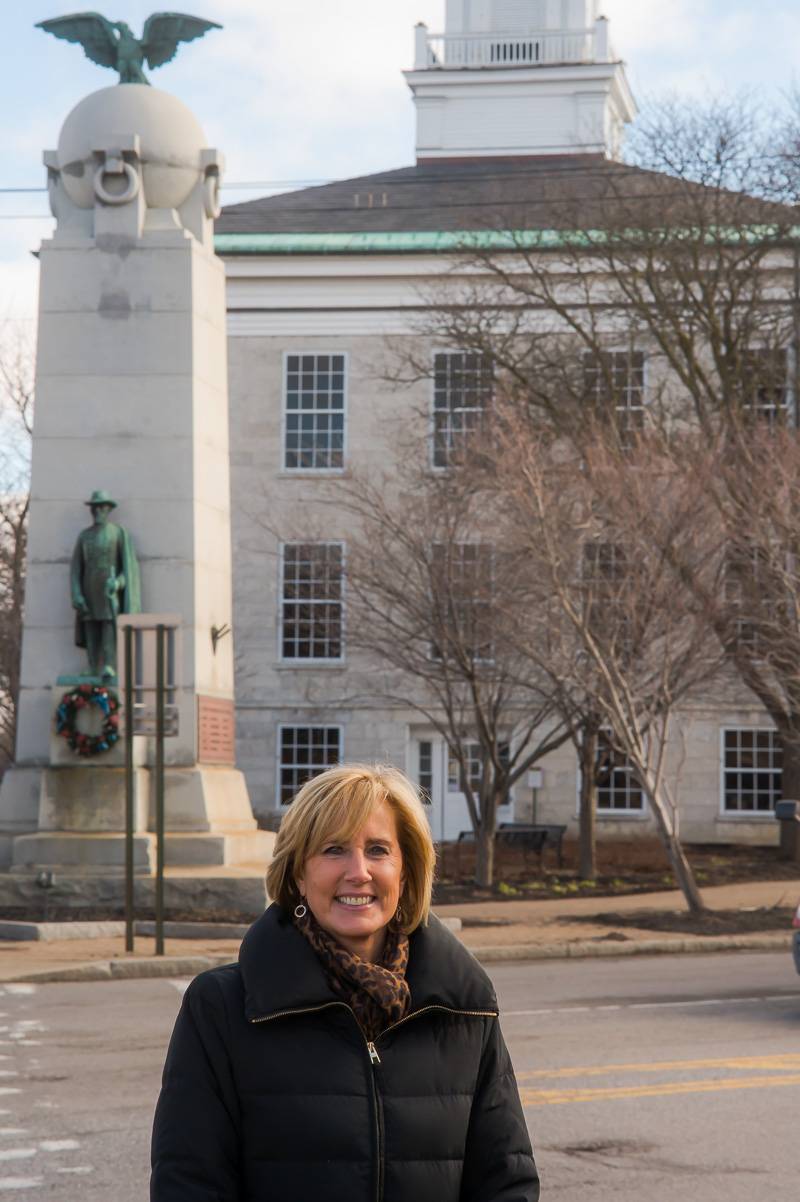
Take any object -- a house, office building, highway, bridge, car -- all will eventually fall apart if not properly maintained.
The same is true of war memorials, the monuments communities erect to honor their war dead and help tell the history of their hometowns.
Rep. Claudia Tenney has co-authored a bill she hopes will help communities preserve those sacred monuments so the legacies they are meant to honor live on well after we're all gone.
The Remembering Our Local Heroes Act, co-sponsored by Rep. Chris Pappas from New Hampshire, allocates $2 million a year over five years that will act as matching funds for community groups to mount efforts to preserve war memorials as well as monuments honoring those who served in law enforcement and fire services.
If a community group, such as a veterans group or a Boy Scout troop, can raise $10,000, for example, the group can apply for a grant of up to $20,000, which would result in a total of $30,000 for the project. If $150,000 is needed for the project, the group would need to raise $50,000. The maximum federal grant under the bill, which is still pending in committee, would be $100,000 per project.
"We really would love to be able to do this," Tenney said. "There are so many areas where you go to, especially throughout my district, where you see these beautiful old monuments, including your Soldiers, Sailors, and Marines Monument that you have here, the Upton Monument, that could definitely be upgraded and cleaned and maintained. A lot of these monuments really aren't being maintained, especially the monument for our heroes."
Tenney stopped in Batavia on Saturday to visit the Upton Monument and discuss her bill with The Batavian.
"This (bill) would allow the federal government to participate in helping maintain veterans memorials and remembering local heroes," Tenney said.
In order to unlock access to the federal grant, all of the money to preserve a monument would need to come from private donations. Local governments could not help fund the project.
The bill combines twin interests and passions for Tenney, recognizing the sacrifices of those who have served their nation and their communities, and history. During the interview, she talked a good deal about Upstate New York's rich history and its contributions to creating the nation during the Revolution, the abolitionists of New York who helped free the slaves, most notably with the Underground Railroad, but also leading figures Frederick Douglas and Harriet Tubman, and New York's efforts to preserve the union during the Civil War and its role in the War of 1812.
"I brought Burgess Owens (to New York), who is a Republican, former football player, a Black Republican, whose hero is Harriet Tubman, his whole life, and he never knew that Harriet Tubman had a house in Auburn," Tenney said. "So I brought him in, and we went everywhere. He was amazed. We did the full tour. We went to all the different sites. And he was like, 'Wow, I can't believe this.' You know, we have such a rich history."
The germ of the bill began when Tenney served in the New York State Legislature, and she learned that Vietnam Veterans often have a hard time unlocking support that's available to other veterans groups because of the lingering controversies of that war. During that time, she visited a group that wished to build a Vietnam memorial, but they couldn't access federal funds. When she was first elected to Congress, she introduced the first version of this bill designed to allow any community group that takes on the task of ensuring local heroes are appropriately honored to tap into a small pot of federal funds to assist the effort.
"We (New York) were critically important in all the wars, whether it's the Revolutionary War, the Civil War, the War of 1812," Tenney said. "I think it's important that we know our history."
The Upton Monument was dedicated in August 1919 (see the 100th-anniversary documentary produced by The Batavian embedded below), with construction funded by donations and contributions from the city of Batavia and Genesee County. It was constructed by Wardon Monuments, a company that built monuments throughout the northeast, including Gettysburg, and had its headquarters on Evans Street in Batavia. Officially, it is the Soldiers, Sailors, and Marines Monument, but it carries a bronze statue of Civil War hero Gen. Emory Upton, who was from Batavia.
At 105 years old, it shows some age -- discolored bronze and cracks in the stone, including a large chunk of granite missing from the base. There has been no known effort over the past several years -- and The Batavian has made inquiries -- among either private groups or the county government to take steps to ensure it is maintained and preserved.
That isn't unusual in her NY-24 district, Tenney indicated, because local governments are so cash-strapped these days.
On Memorial Day and Veterans Day, Tenney said she often goes for a ride on her motorcycle through the district and will stop at various memorials along her route.
"I'll drive around to the monuments and just kind of place a little flag or just kind of see what condition they're in," Tenney said. "I did that a couple of years ago, I didn't last year, but I did that, and it was just really interesting to see how many people actually do care about what's in their community. But there's no money, and all these local governments are strapped with unfunded mandates from the state and all these other issues, so we have this as something that is supplemental."
When we remember our history, Tenney noted, it binds us to our community and it teaches our children the value of their community.
"If you don't remember the people who really founded your community, the principles that it was founded upon and that people actually served, died, sacrificed, lost life and limb, I think that really sends a message," Tenney said. "We want to send a message to our young people that their community is worth something and that they should be proud of their community, of the people that founded it."
Photos by Howard Owens.
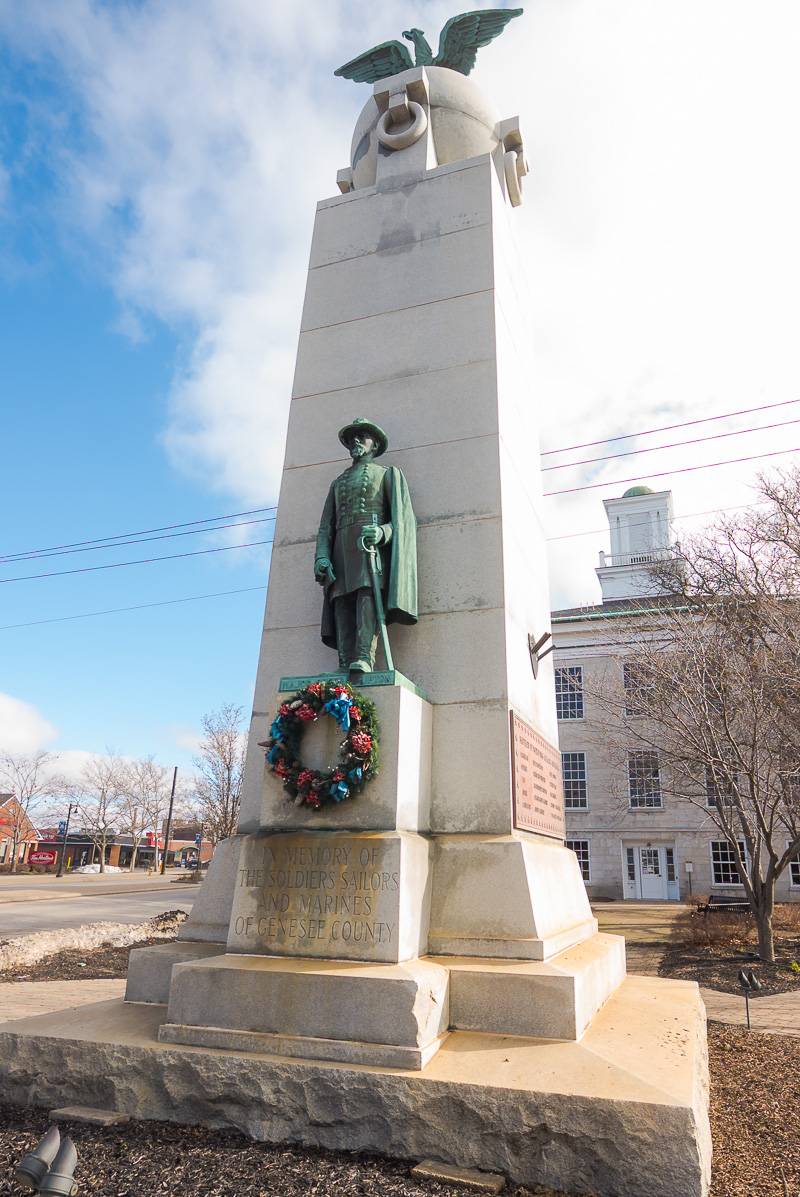
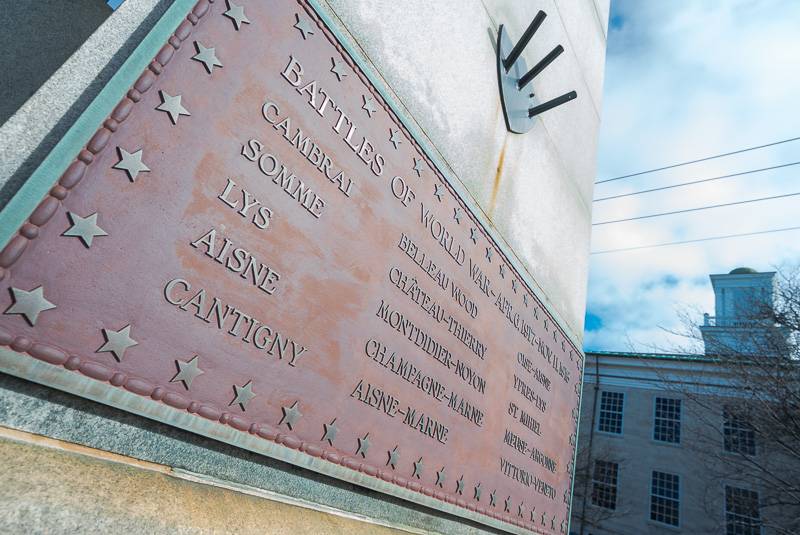
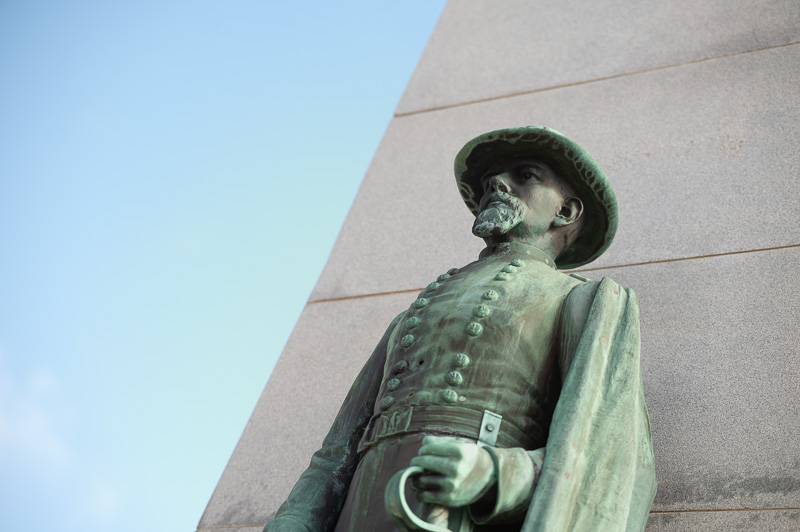
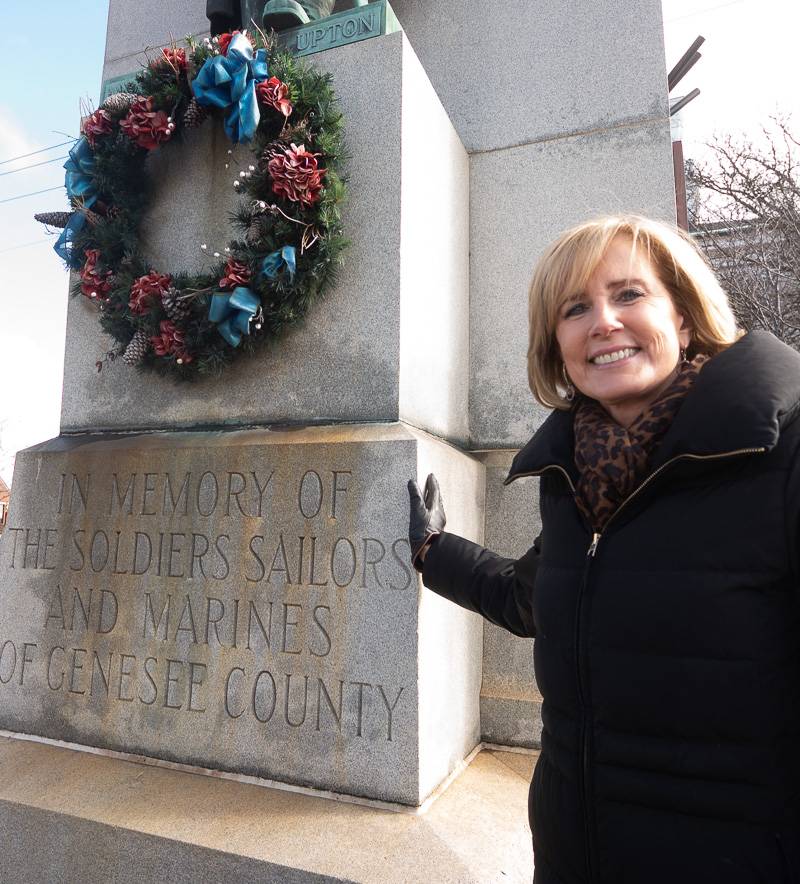
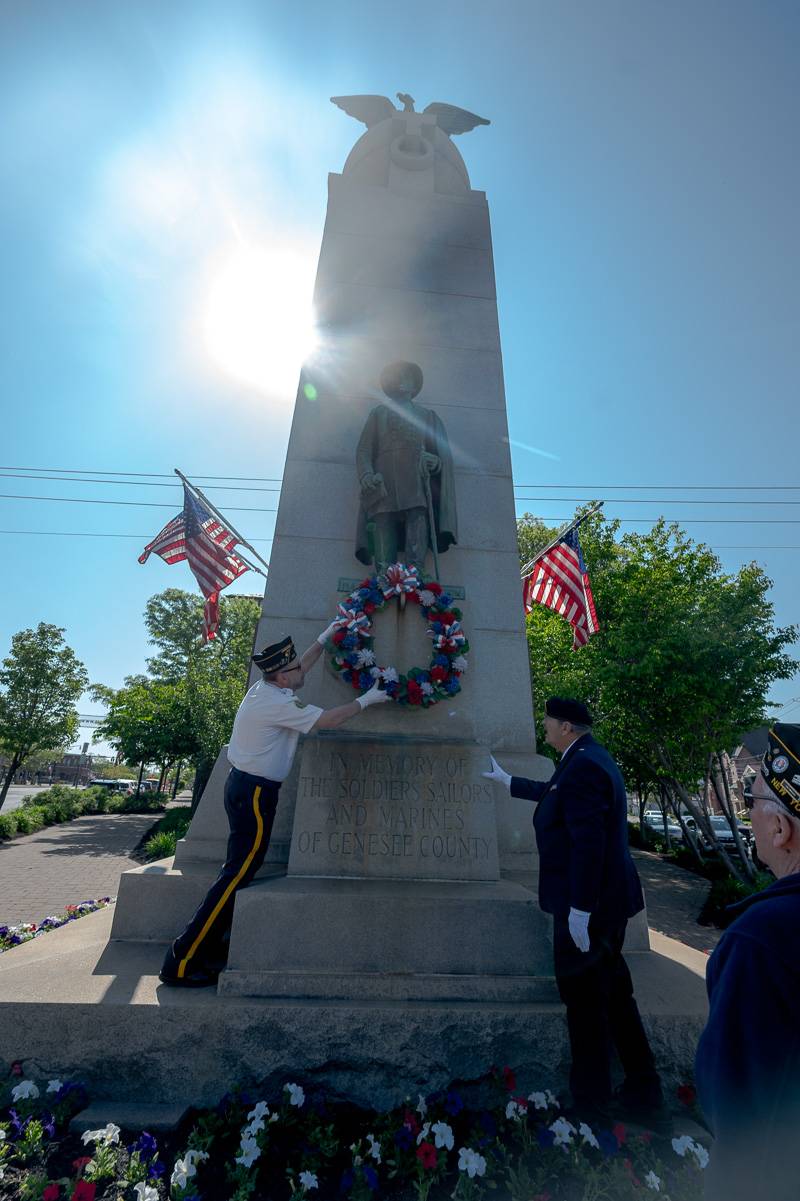
Area veterans gathered at the Soldiers, Sailors, and Marines Monument, also known as the Upton Monument, in Batavia this morning for a placing of a wreath on the monument in honor of Genesee County's war dead.
It is one of several Memorial Day services today. The Batavian will have more coverage of the various parades and ceremonies.
Photos by Howard Owens
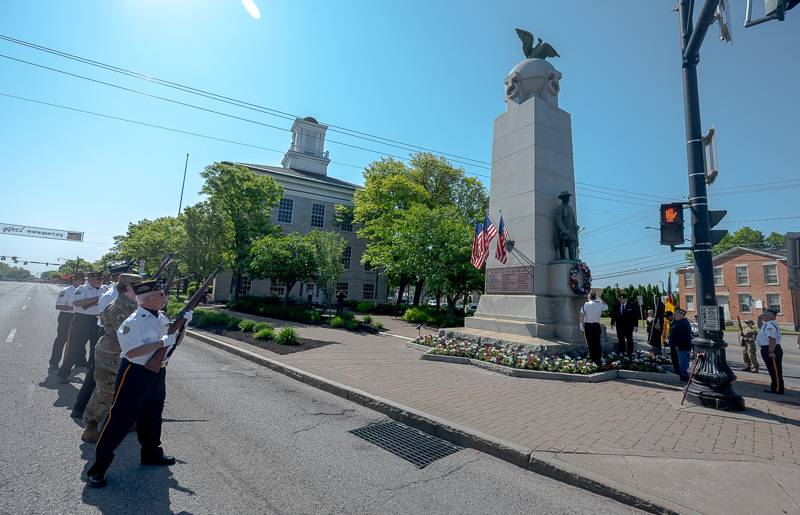
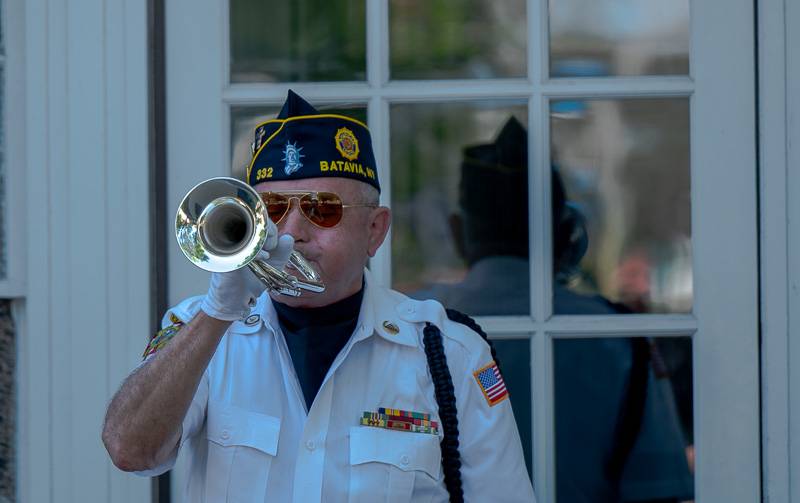
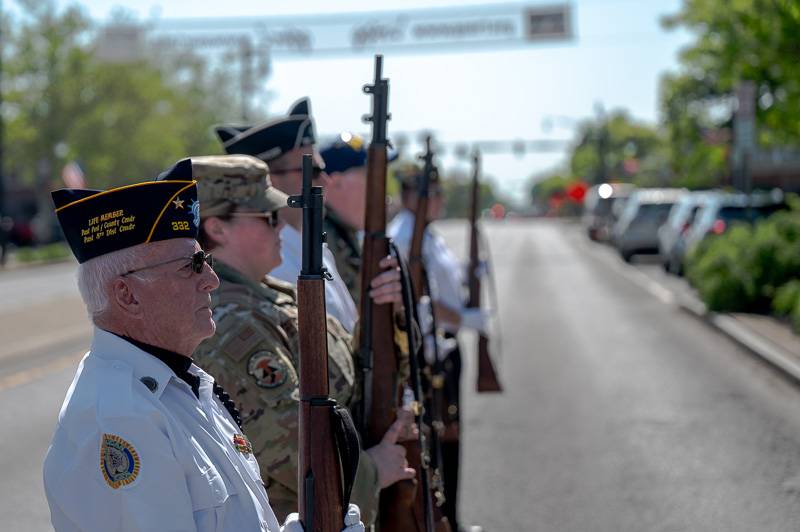
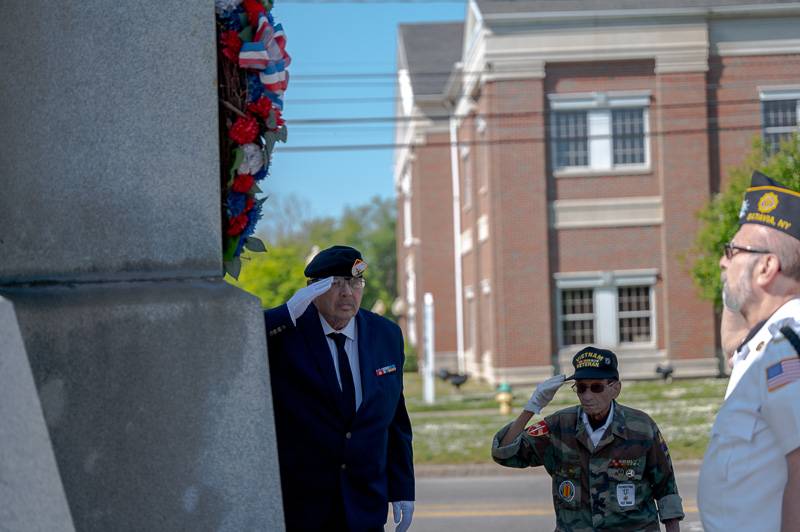
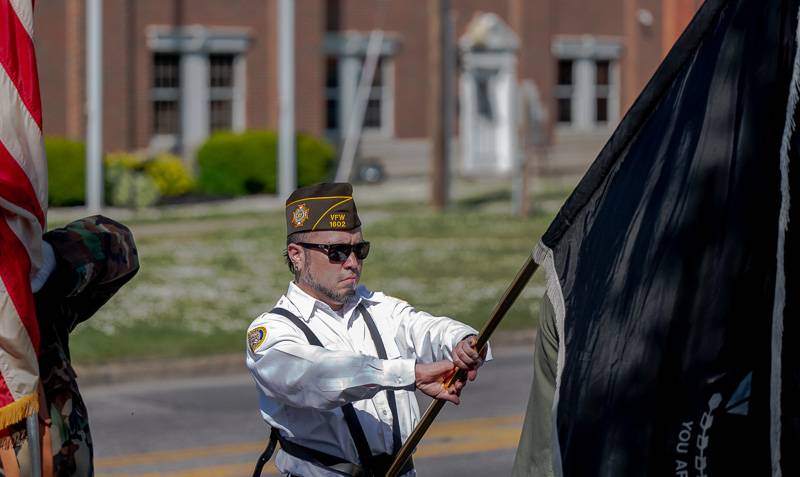
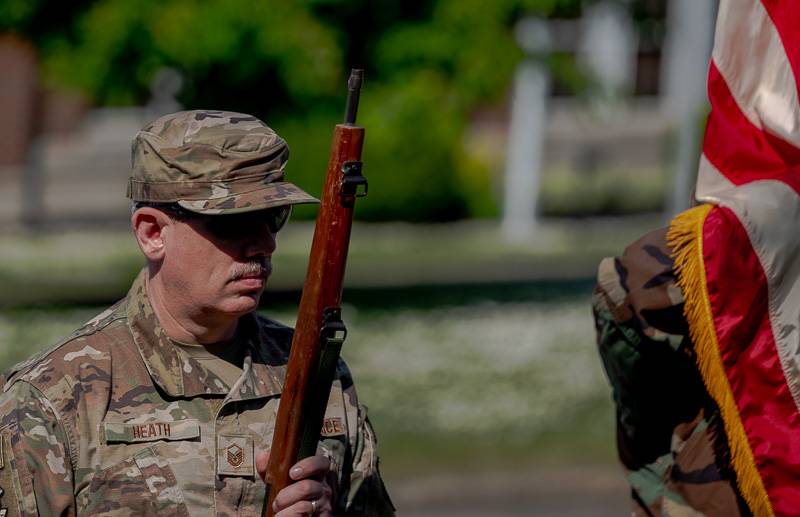
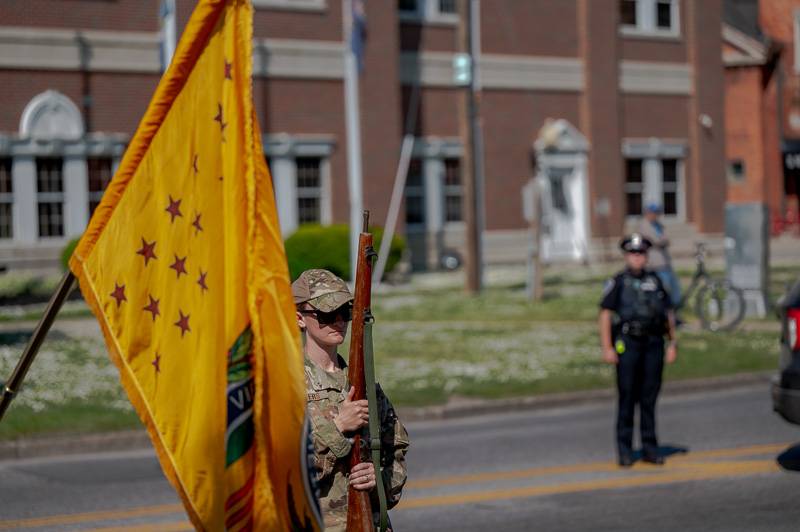
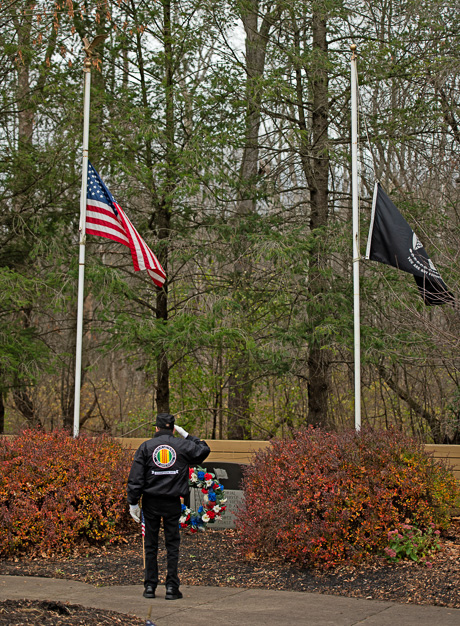
Genesee County veterans gathered today at the locations and landmarks associated with the local men and women who served the nation in times of war and peace.
The ceremonies started at 9 a.m. at Genesee County Park, where former Assemblyman Dan Burling was the keynote speaker and he celebrated the freedom that the men and women who served helped secure.
"We just had an election yesterday," Burling said. "And though it may not appear to be everything that we want it to be, it was a free election. It was a free election that was guaranteed by the men and women who have served this country over the years, over many, many, many years and still served today."
Other ceremonies were held at the VA Hospital, the NY State Vets Home, the Soldiers and Sailors Monument (Upton Monument), Trigon Park, the War Memorial at Jerome Center, and GCC.
"We're all brothers and sisters," Burling told the veterans in Bethany. "We all served together and anyone who puts the uniform on, who puts their hand on the Bible and swears that they will defend this nation is a friend of mine and a friend of everyone, so I want to thank you all, all my friends."
Photos from Genesee County Park, the VA Hospital, and the Upton Monument. Photos by Howard Owens.
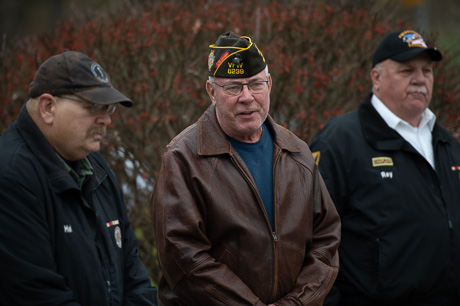
Dan Burling, middle.
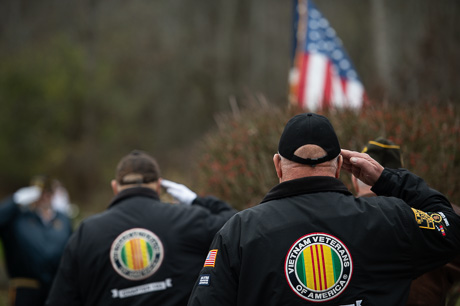
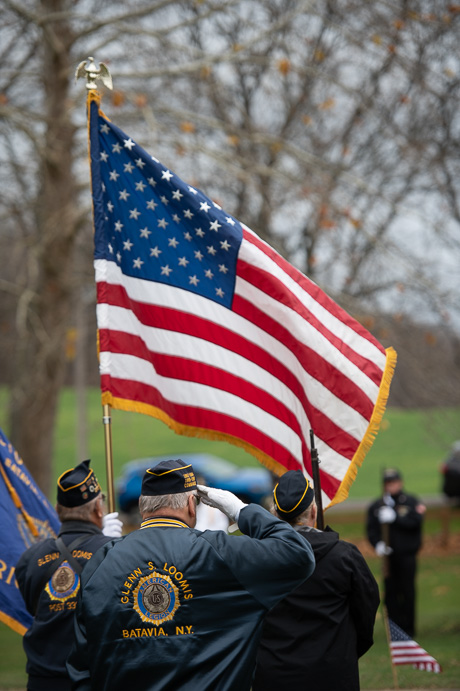
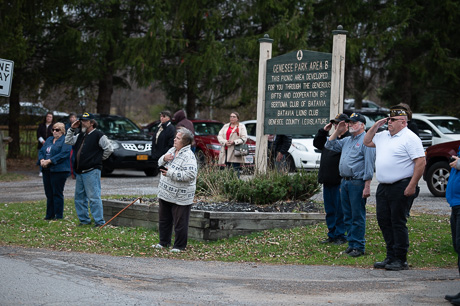
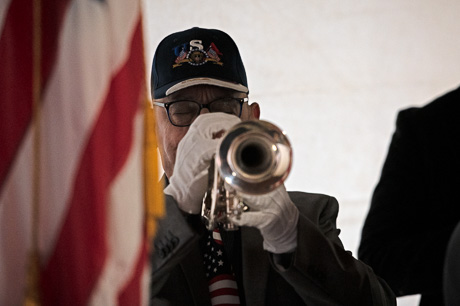
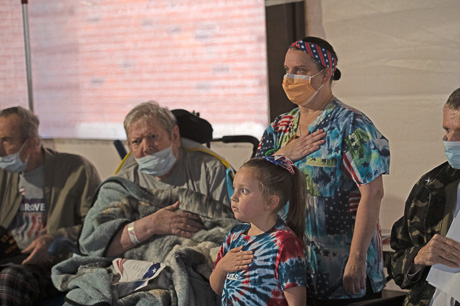
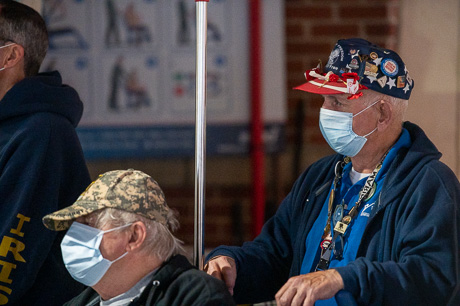
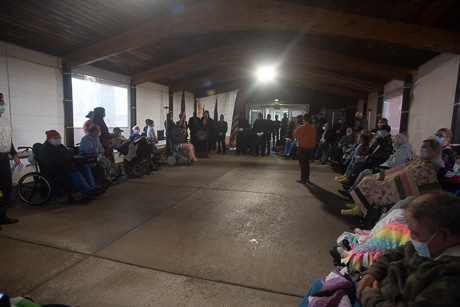
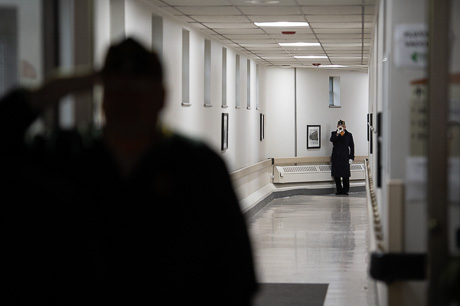
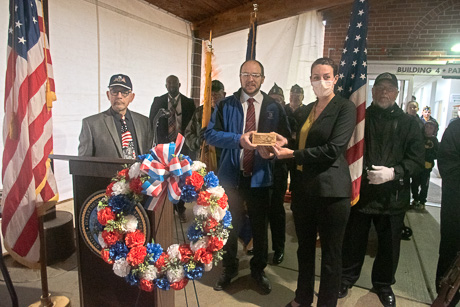
Frank Panepento, a teacher at Batavia Middle School, Nathan Korzelius, middle school principal, and Danielle Bergman, assistant medical director of the VA Center. Middle school students made wood blocks with a patriotic etching as a gift for veterans at the VA Center.
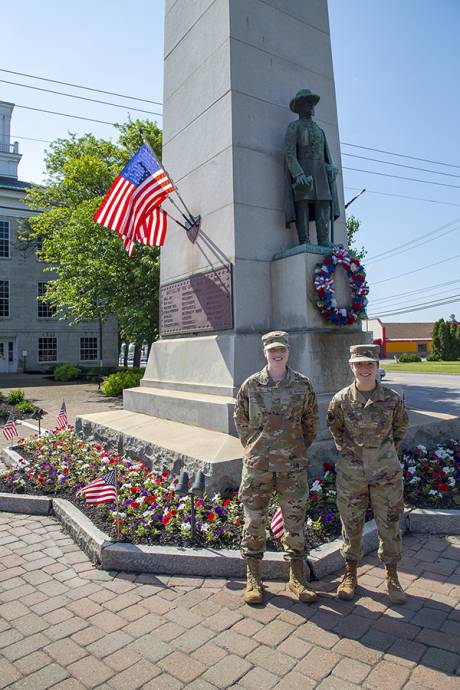
U.S. Air Force airmen stand guard as a Memorial Day vigil at the Soldiers and Sailors Monument, or the Upton Monument, this morning at Ellicott Street and Main in Batavia.
Emory Upton's Colt Single Action Army Revolver recently sold at auction for $345,000.
Don Burkel said the results of the auction show that the Batavia-native is an important historical figure.
"He really was a very important person in American military history and apparently is still highly regarded," Burkel said.
Of course, the Holland Land Office Museum would have loved to have acquired Upton's revolver but the price was out of the museum's range, Burkel said.
The video above indicates the revolver is the same one Upton used to take his own life on March 14, 1881, at the Presidio in San Francisco after suffering for months with debilitating headaches.
Previously:
A view of Veterans Day at the VA Hospital and the Upton Monument.
And below, a replay of our documentary on the Upton Monument.
Two days ago, I happened across Dan Sprague jamming on a little death metal on his way to band practice. Sprague said he's a member of three bands, including the folk-rock band he was practicing with that day.
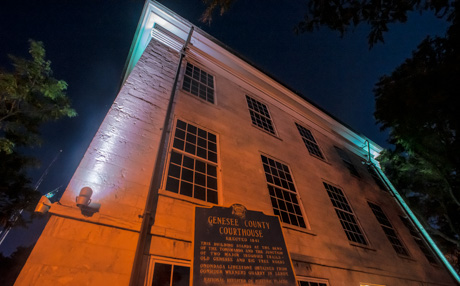
Press release:
Representatives of Lighting Design Innovations and Cedar Street Sales and Rentals are pleased to announce the completion of the third phase of the feature lighting at the Old Genesee County Courthouse site in Batavia.
The firms sponsored the donation of lighting design activities and lighting system luminaires, components, and advanced control system to accentuate the building façade and its location in the cityscape by lighting the courthouse corners with RGBW color changing LED luminaires.
The advanced lighting control system allows the County to program coordinated colored light displays for the new courthouse corner lights and the cupola, which received its color-changing light as the first phase of the project. Initial system programming and controller training was sponsored by Vertex Lighting Solutions.
The illuminated façade of the Old Genesee County Courthouse is the backdrop for the new white LED lighting that was provided for the Soldiers’, Sailors’, and Marines’ Monument as the second phase of this project. The monument lighting was unveiled Memorial Day 2019 in time for the monument’s centennial, celebrated in August of 2019.
Although the final phase implementation was temporarily delayed by the COVID-19 pandemic, County personnel worked with the consultants to complete the work in time to be shared with the community for Labor Day 2020.
Photos and video by Howard Owens.
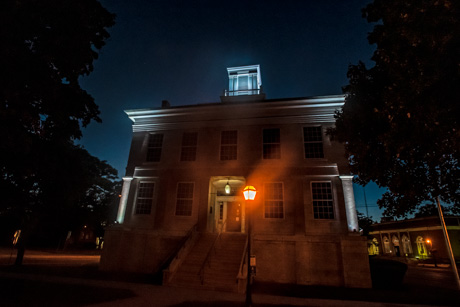
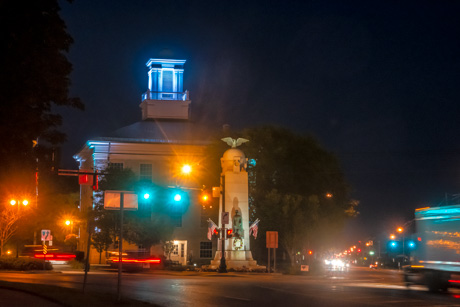
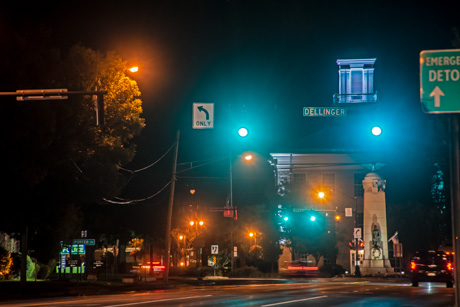
A Batavia resident spent most of the afternoon carrying a protest sign in front of the Upton Monument at Ellicott and Main in Batavia that read "George Floyd is Every man!"
George Floyd, 46, died while in police custody in Minneapolis on May 25 while a police officer, based on a video made by a teenage witness, kept a knee on his neck for 8 minutes and 46 seconds.
Floyd was handcuffed and lying face down on the road, while the officer had his knee on his neck.
During the incident, Floyd told officers multiple times he couldn't breathe. At one point, he cried out, "Mama!" according to news reports. Floyd reportedly said, "My stomach hurts, my neck hurts, everything hurts," and requested water. The police do not audibly respond to Floyd who begged, "Don't kill me."
The police officer who kept his knee pressed against Floyd's neck is reported to be Derek Chauvin. He has been charged with third-degree murder and manslaughter. Chauvin along with fellow officers Thomas K. Lane, Tou Thao, and J. Alexander Kueng, were fired immediately after the incident.
Chauvin reportedly had 19 prior complaints against him for alleged misconduct.
Floyd was originally from Houston, Texas, and had a prior felony arrest but moved to Minnesota to start a new life and had no criminal record in Minnesota. He and Chauvin had worked together as security guards at a nightclub prior to closure of the establishment due to coronavirus.
At the time of the deadly incident, Floyd was accused of passing a counterfeit $20 bill.
The incident has touched off protests and riots nationwide.
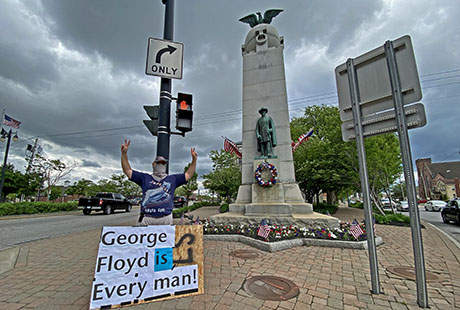
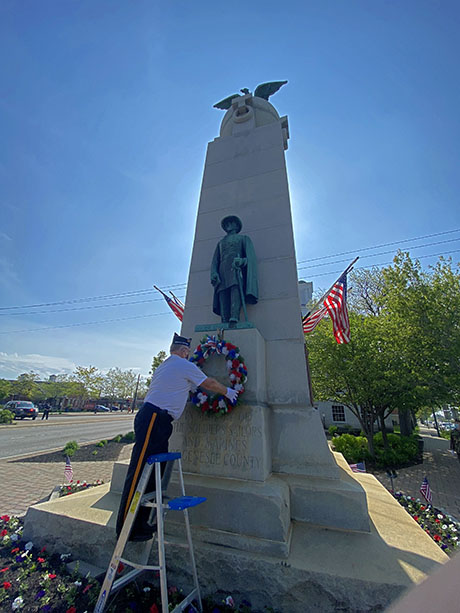
Photos from the Memorial Day service today at the Soldiers and Sailors Monument (The Upton Monument) in Batavia.
We'll have video report posted tonight or tomorrow of the Memorial Day Service at the War Memorial at St. Jerome's.
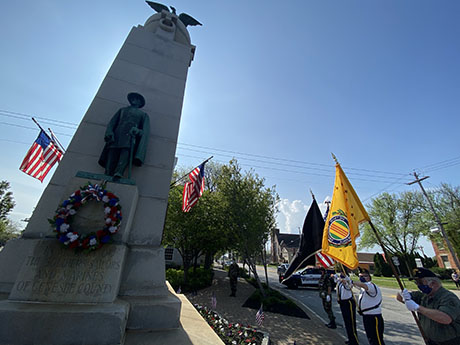
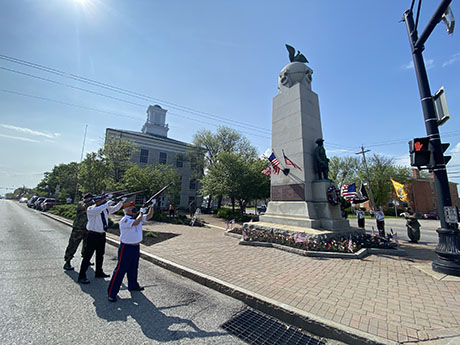
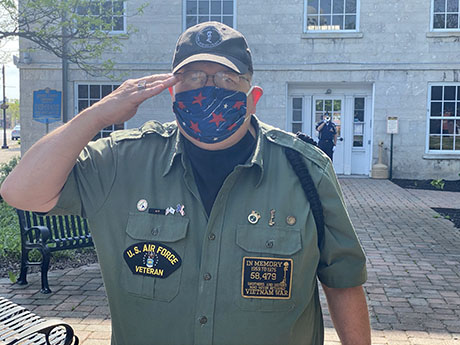

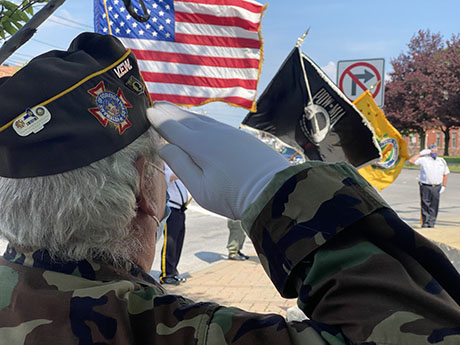
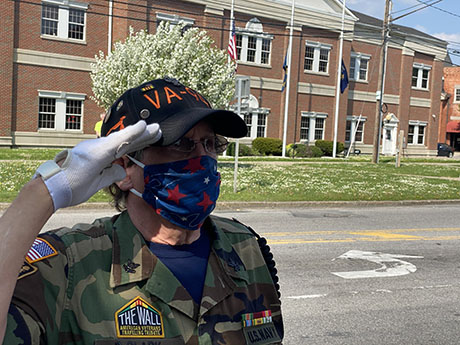
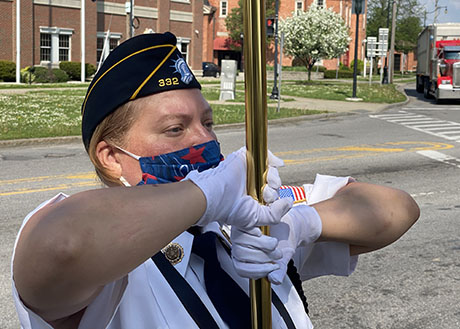
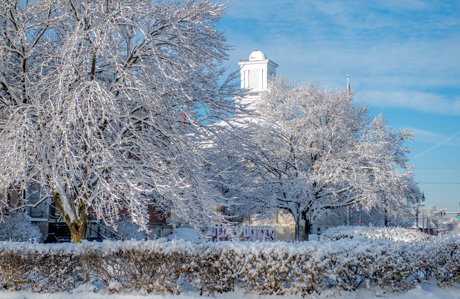
It was a beautiful morning in Genesee County, with temperatures in the teens so trees stayed flocked even though the sun was out and the sky was blue.
Top photo, from Court Street, looking toward the Old Courthouse.
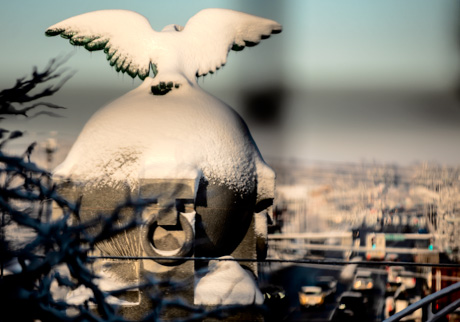
The snow-covered eagle atop the Upton Monument taken through the window on the third floor of the Old Courthouse.
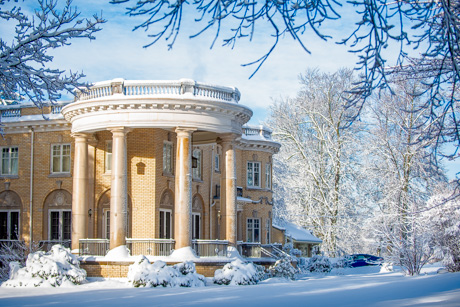
The Rowell Mansion.
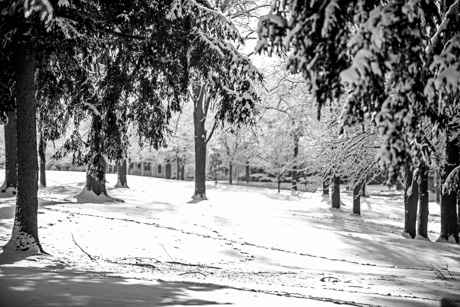
Centennial Park (in black and white).
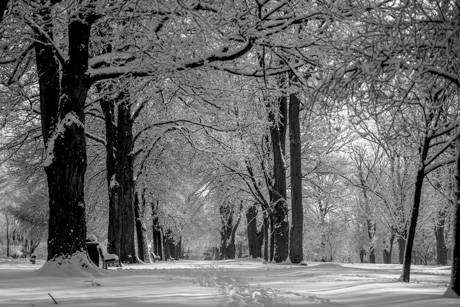
Centennial Park (in black and white).
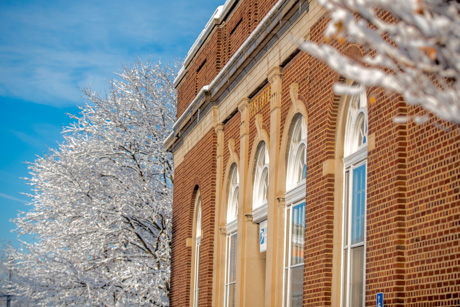
The Barber Conable Post Office Building in Batavia.
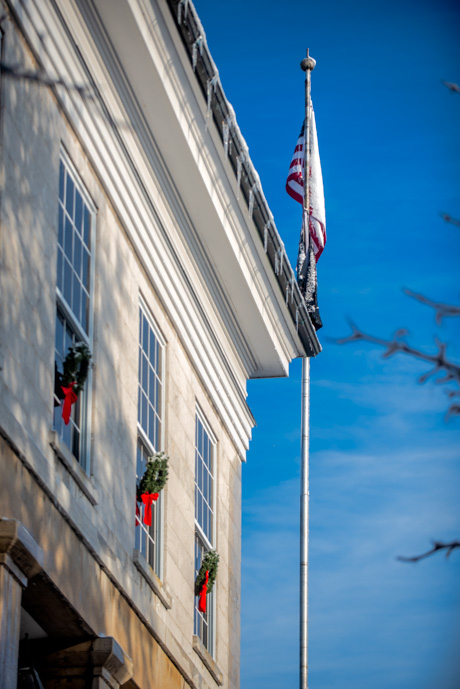
The flag pole outside the Old Courthouse.
Back in May, I decided to make a documentary about the Upton Monument to coincide with its centennial. The initial deadline for finishing it was the rededication ceremony in August. Obviously, I missed that deadline, so then I tried for the end of August. Still, wasn't done.
Finally, it's done.
Thank you to Ryan Duffy, Michael Eula, Larry Barnes, Jim Neider, and Bill Kauffman for their help and interviews, and Dan Fischer for his narration, and to Billie Owens for reading the poem by Bessie Chandler.
I imagine more than 100 hours of work went into making this. I hope you like it. I thought it important to create something documenting and celebrating the history of our community's most significant landmark.
Chances are, everybody who watches this will learn something new about either the history of the monument, the life of Emory Upton, and the context of the times in which it was built.
One hundred years ago, in August 1919, the folks of Genesee County dedicated the Soldiers and Sailors Monument, better known as the Upton Monument. To commemorate the centennial of the monument, the Veterans Council and the American Legion conducted a rededication ceremony on Saturday.
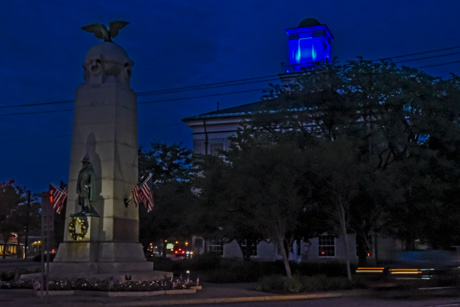
I stopped by the Upton Monument earlier this evening to get a picture of the 100-year-old landmark lit by the new LED system.
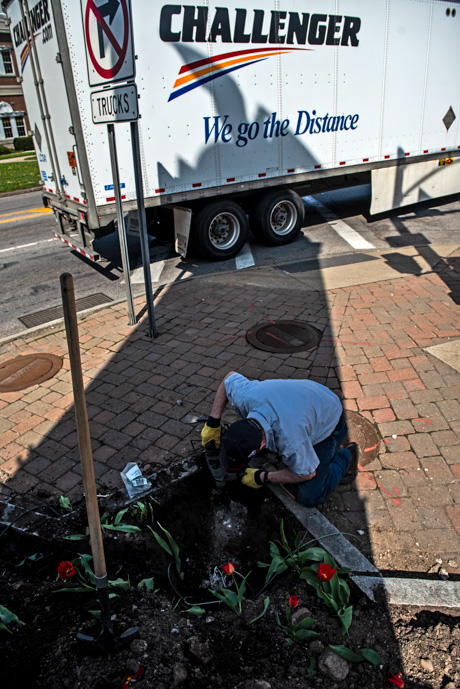
Terry Ross, from the Genesee County maintenance department, works on a new lighting system at the base of the Upton Monument.
The LED system was donated by Batavia-based Lighting Design Innovations, which two years ago donated a new color-changing light system for the Old Courthouse cupola.
The new lights are on a 14-volt system and draw only 20 watts. They are replacing four 400-watt lights.
Ross said lights are being installed to light the plaques of the Soldiers and Sailors Monument and another light, which is what he's working on in the picture, will illuminate the statue of Gen. Emory Upton. Ross said the DOT has given permission for the county to install an LED light at the top of the stoplight poll next to the monument that will illuminate the eagle at the top, but first the county must figure out how to run the power up to the light on the outside of the pole.
The Soldiers and Sailors Monument is 100 years old this year. It was dedicated in August 1919.
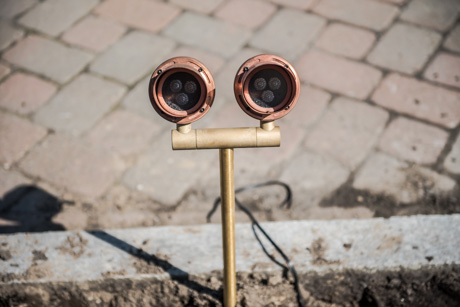
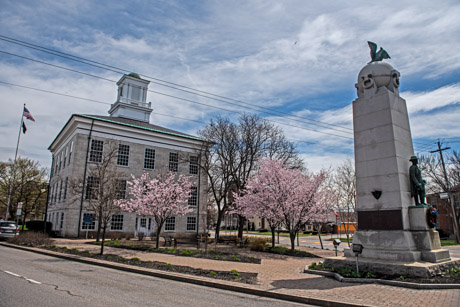
This is the prettiest time of year around the Old Courthouse and the Soldiers and Sailors Monument.
Also, the daffodils in front of City Hall are blooming.
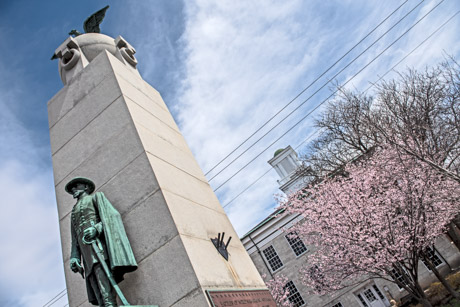
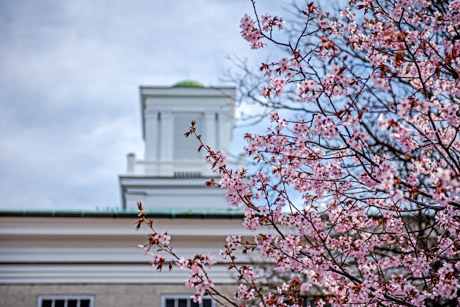

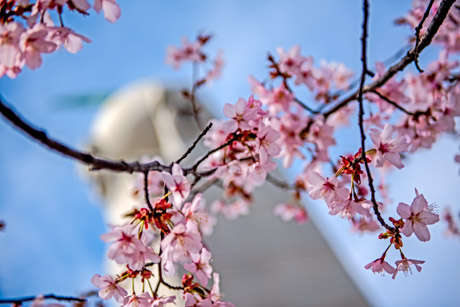
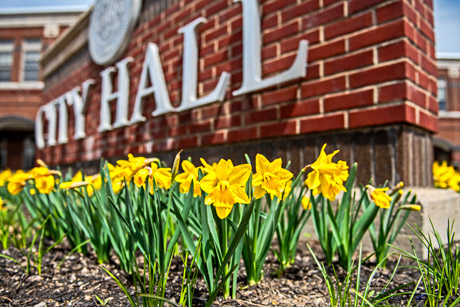
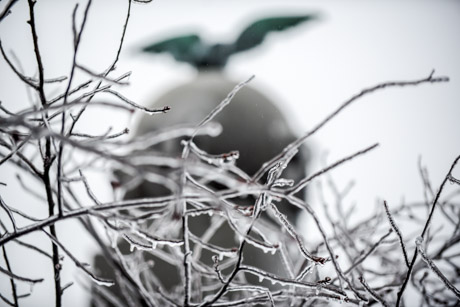
Icy covered trees throughout the region today, including behind the Upton Monument at Main and Ellicott in Batavia.
There's a weather advisory for tonight. Expect more ice through the morning.
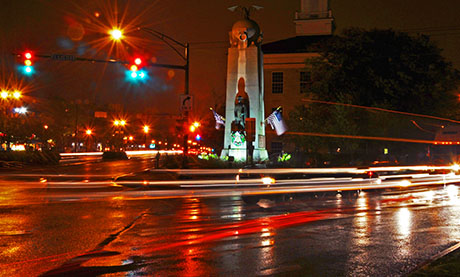
It's not exactly a facelift Gen. Emery Upton will get on the Soldier's Monument at the corner of Ellicott and Main streets in the City of Batavia, but when his bronze sculpture turns 100 next year, you should be able to see it better at night.
Lighting Design Innovations, a Batavia-based company, is planning to install new lighting on the monument next month thanks to $1,500 in donations the company has received for the project.
The county's Ways and Means Committee is recommending the Legislature accept the donation.
Assistant County Manager Matt Landers said company officials describe the current lighting as "flood lights" and their designers will come up with a plan to appropriately light the monument with more modern fixtures to make it more attractive when viewed at night.
LDI, which donated the rotating color lighting for the cupola of the Old Courthouse last year, is also trying to secure $6,500 in donations to pay for colored lighting on two of the pillars of the Old Courthouse.
"They are obviously very passionate about lighting," Landers said.
The offer was well received by the members of the Legislature.
"I think it’s very generous of them," said Marianne Clattenburg, who is chair of Ways and Means.
The Soldier's Monument was first conceived by local citizens in 1882 as a way to pay tribute to those from the area who died in the Civil War. A committee was formed to champion the idea but fundraising, apparently, didn't start until 1903. The first donation came from Albert Knapp.
By the end of the year, the fund reached $1,713.66.
In 1904, voters approved a $10,000 expenditure for the monument. The city agreed to pay another $15,000.
In 1907, there was a move to put Lincoln's bust atop the monument.
The next year, there was an effort to locate the monument in what is now Centennial Park (then called State Park) instead of its present -- and originally proposed -- location.
In 1911, the Genesee County Soldier's Monument Association was formed.
In 1917, the Board of Supervisors viewed a wooden model of the proposed monument and appropriated $10,000 for the project.
The city, at that point, was willing to chip in $5,000.
The granite structure was constructed in Barre, Vt., in 1918. C.A. Worden, a New Yorker, was the designer.
The base was placed in August 1918.
By October 1918, crews were ready to affix the eagle at the top, with a 3-foot, 10-inch tail, and an eight-foot wingspan. The bronze figure of Gen. Emory Upton was paid for by his sister, Sarah Edwards. Another sister, Sara Upton Evans, also made a contribution.
Supervisors accepted monument in January 1919.
As of February 1919, the City had not yet paid for its share of the monument. The county threatened to sue the city and after the county paid the $5,000 due from its contingency fund, the City Council approved paying its $5,000 share In April 1919.
The monument was dedicated Aug. 6, 1919.
Photo: File photo by Howard Owens.
Copyright © 2008-2022 The Batavian. All Rights Reserved. Privacy Policy | Terms of Service